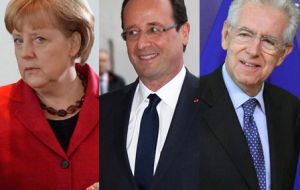MercoPress. South Atlantic News Agency
Euro-zone tells members to prepare contingency plans for a possible Greek exit
 Crucial summit in Brussels will face Merkel, Hollande and Monti
Crucial summit in Brussels will face Merkel, Hollande and Monti Euro zone officials have told members of the currency area to prepare contingency plans in case Greece quits the bloc, an eventuality which Germany's central bank said would be testing but “manageable”.
“The EWG agreed that each Euro zone country should prepare a contingency plan, individually, for the potential consequences of a Greek exit from the Euro,” said one Euro zone official.
Although minds will be focused by the prospect of Greece leaving the currency area, now called “Grexit” and something EU leaders say they want to avoid, disagreements over a plan for mutual Euro zone bond issuance and other measures to alleviate two years of debt turmoil have already been laid bare.
In its monthly report, Germany's Bundesbank said the situation in Greece was “extremely worrying” and it was jeopardizing any further financial aid by threatening not to implement reforms agreed as part of its two bailouts.
It said a Euro exit would pose “considerable but manageable” challenges for its European partners, raising pressure on Athens to keep its painful economic reforms on track.
Greek officials have said that without outside funds, the country will run out of money within two months.
For the first time in more than two years of debt-crisis meetings, the leaders of France and Germany have not huddled beforehand to agree positions, marking a significant shift in the Franco-German axis which has traditionally driven European policymaking.
Instead, new French President Francois Hollande met Spanish Prime Minister Mariano Rajoy in Paris to discuss policy, before the pair travelled to Brussels for the summit.
Despite fears Greeks could open the departure door if they vote for anti-bailout parties at a June 17 election, Spain, where the economy is in recession and the banking system is in need of restructuring, is at the frontline of the crisis, with concerns growing that it too could need bailing out.
After meeting Hollande, Rajoy said he had no intention of seeking outside aid for Spain's banks.
Hollande's election victory has significantly changed the terms of the debate in Europe, with his call for greater emphasis on growth rather than debt-cutting now a rallying cry for other leaders.
That has set up a showdown with German Chancellor Angela Merkel, who supports growth but whose primary objective is budget austerity and structural reform.
At his first EU summit, Hollande has chosen to make a stand on Euro bonds - the idea of mutual sing Euro zone debt - despite consistent German opposition to an idea that has been hotly debated for more than two years.
He will have support from Italian Prime Minister Mario Monti and European Commission President Jose Manuel Barroso, among others. But Merkel shows no sign of dropping her objections to the proposal, which she has said can only be discussed once there is much closer fiscal union in Europe. The Netherlands, Finland and some smaller Euro zone member states support her.




Top Comments
Disclaimer & comment rulesCommenting for this story is now closed.
If you have a Facebook account, become a fan and comment on our Facebook Page!